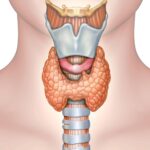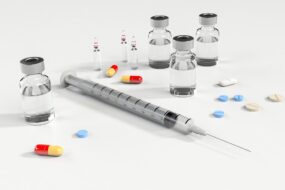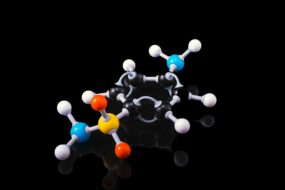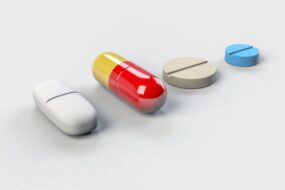Aspirin is a prototype of salicylates. It is rapidly converted to salicylic acid, which is responsible for most actions.
Other actions result from the acetylation of certain macromolecules, including the COX enzyme.
It is one of the oldest analgesic-antiinflammatory drugs.
Mechanism of action.
- Inhibition of the synthesis of prostaglandin by cyclooxygenase enzyme.
- Inhibition of platelet aggregation.
- Has antipyretic and analgesic activity.
Clinical uses.
- Relieve pain and fever.
- Acute rheumatic fever.
- Anti-inflammatory
- Adjuvant in acute coronary syndrome.
- Used in Percutaneous transluminal coronary angioplasty.
- Ischemic shock and transient ischemic attack.
- Used in colorectal cancer.
Adverse effects.
- Nausea, vomiting, epigastric distress, increased occult blood loss in stools at analgesic dose.
- Gastric mucosal damage and peptic ulceration.
- Hypersensitivity and idiosyncrasy include; rashes, fixed drug eruption, urticaria, rhinorrhoea, angioedema, asthma, and anaphylactoid reaction.
- Salicylism syndrome includes dizziness, tinnitus, vertigo, and reversible hearing and vision impairment.
- Excitement and mental confusion, hyperventilation, and electrolyte imbalance.
Drug interaction.
- Aspirin reduces protein-bound iodine levels by displacing thyroxine, but hypothyroidism does not occur.
· The drug decreases the effects of probenecid by acidic drug competition for renal tubular clearance. It also decreases the uricosuric action of probenecid.
- Aspirin increases the toxicity of ketorolac by pharmacodynamic synergism.
- It increases the levels of methotrexate by decreasing renal clearance.
- Ibuprofen decreases the antiplatelet effects of low-dose aspirin by blocking the active site of platelet cyclooxygenase.
- Aspirin blunts the diuretic action of furosemide and thiazides and reduces K+ conserving action of spironolactone.
Contraindications.
- Diabetics
- Juvenile rheumatoid arthritis.
- Peptic ulcer
- Bleeding tendencies
- Children who are suffering from chicken pox or influenza. Due to the risk of Reye’s
syndrome
- Cautious use in chronic liver disease.
•Aspirin should be stopped one week before elective surgery.
Aspirin poisoning.
The fatal dose in adults is estimated to be 15–30 g but is considerably lower in children.
Manifestations are:
- Vomiting, dehydration, and electrolyte imbalance.
- Acidotic breathing, hyper or hypoglycemia,
- Petechial hemorrhages
- Restlessness, delirium, hallucinations, hyperpyrexia,
- Convulsions, coma, and death due to respiratory failure and cardiovascular collapse.
Treatment:
- External cooling and intravenous fluid with Na+, K+, HCO3¯, and glucose.
- Gastric lavage to remove the unabsorbed drug.
- Alkaline diuresis or hemodialysis to remove the absorbed drug.
- Blood transfusion and vitamin K should be given if bleeding occurs.












